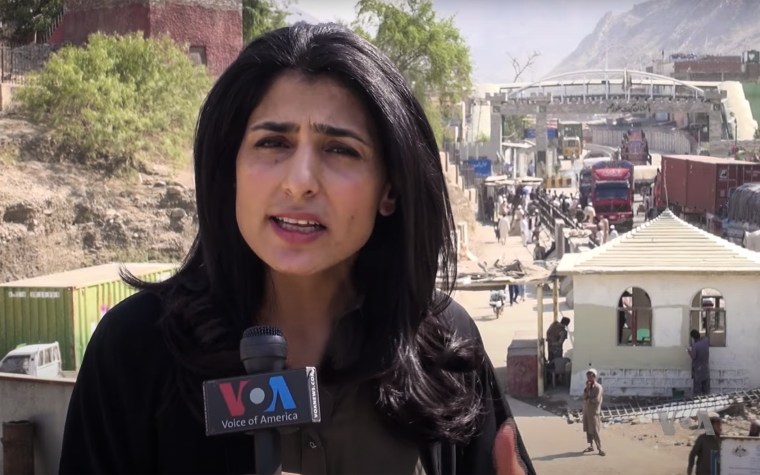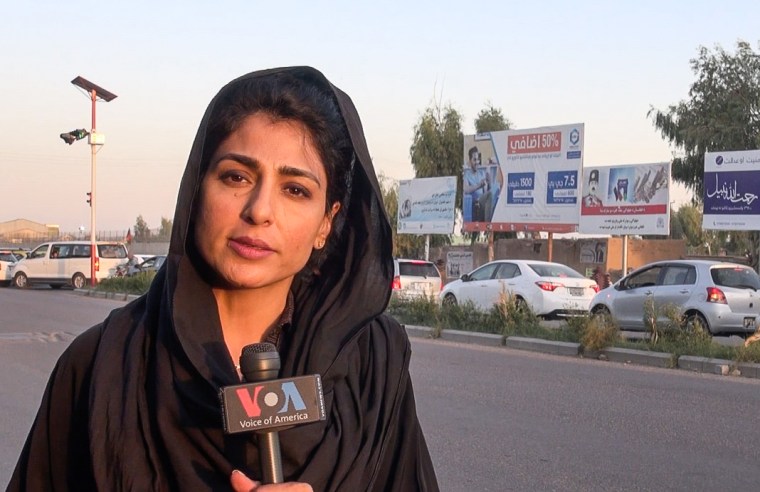WASHINGTON — Afghan journalists with the Voice of America and other U.S.-funded media outlets were shocked they were not evacuated out of Afghanistan by the U.S. government and fear they will be forgotten, one colleague who did make it out said Friday.
More than 500 Afghan reporters and their families who worked for U.S. government sponsored news outlets remain in Afghanistan after several attempts to evacuate them failed in the chaotic final days of the U.S. military presence in Afghanistan.
One of their colleagues, VOA correspondent Ayesha Tanzeem, managed to make it out on a European military aircraft to Pakistan, days before American forces pulled out of Kabul, she told NBC News.
“I talk to them almost daily. It's heart-wrenching when they reach out to you and tell you how distressed they are,” Tanzeem said of her stranded fellow reporters.
“One of them told me, ‘I’m worried about my children. If something happens to me, if they kill me, please don't forget about them,’” Tanzeem said. “How do you react to a message like that?”
The Biden administration has pledged to bring the journalists to safety, but Tanzeem said the Afghan reporters are worried, she said in a phone interview from Islamabad.

“Now that the evacuation is technically completed, their fear is that they will be left behind, that people will just forget about them,” she said.
Her colleagues were confused and distraught that they were not among those evacuated out of Kabul, said Tanzeem, bureau chief for Afghanistan and Pakistan.
“They were disappointed, they were frustrated. They could not understand why” they were not flown out of Kabul, she said.
“They kept asking me — why is it happening? Why is everyone else around us being evacuated while we are still here?”
She added: “I think they were in shock. But they’re hoping that something will still happen.”
Female journalists working with U.S.-funded Voice of America and Radio Azadi, as well as other local media outlets, now fear going out to report given the Taliban’s hostility to women’s rights and its record of repression when it ruled the country from 1996 to 2001, according to Tanzeem.
“Several of them have told me that they don't think they can report independently as they used to do before,” she said.
Afghans working for Western media are under less threat than those who report in the country’s local languages, like her colleagues at VOA and Radio Azadi, Tanzeem said.
“The local journalists who for years have stayed in Afghanistan and, in the local language, who did independent stories that included stories about human rights violations or atrocities by the Taliban, are now scared, because the Taliban read their stories. Some of them were threatened on Twitter and Facebook,” she said.
“The television journalists in particular are worried because the moment they go out of the house they’re worried someone might recognize their face,” she said. “They’re worried about getting recognized on the streets.”
She said she had first-hand knowledge of one of her male colleagues being assaulted by the Taliban a few days ago.
“I have at least one confirmed report of a person who was beaten up by the Taliban with sticks as he left his house to get money from the bank. He came home and had literally red stripes on his back from the beating,” she said.
Apart from her colleagues, other Afghan journalists, civil society activists and women’s rights advocates were also trying to find a way out of the country, she said.
The Taliban has indicated it will allow Afghans to travel out of the country, but it has also suggested it does not want to see an exodus of educated Afghans.
“At what point will the Taliban feel the pressure of the brain drain? Is it possible that they may renege and we don't want more Afghans to leave?” she said. “It’s the uncertainty of the situation. Nobody knows when and how it will unfold.”
Tanzeem said she feels fortunate that she was flown out of Kabul but is plagued by guilt that she is safe while her colleagues are at risk.
“I am one of the lucky ones. I have local colleagues who are more in danger than I ever was,” she said.
Voice of America’s acting director, Yolanda López, said the organization was working around the clock to get the journalists out of Afghanistan.
“We are incredibly disappointed that our efforts over the past few weeks to get our colleagues safe passage out of Afghanistan have been unsuccessful,” Lopez said.
“We remain committed to continuing to do everything we can to help all of our journalists and their families who wish to leave the country and get them to safety,” she said.
The administration remains committed to getting them to safety, State Department spokesperson Ned Price told reporters.
"They have served the American people with their journalism, with their work. We absolutely do have a commitment to them," Price said.
"We are working on all possible options to effect their safe departure from Afghanistan," Price said, adding that he would not share the advice provided to the Afghans to protect their safety.
The Biden administration has come under sharp criticism from lawmakers and veterans groups for its handling of the evacuation from Kabul and specifically over the plight of the Afghan journalists who work for the Voice of America and Radio Free Europe/Radio Liberty, news outlets funded by the U.S. government.
Representatives of the broadcasters had repeatedly raised concerns about the safety of their journalists, and senior administration officials had reassured managers at the news outlets that the Afghan reporters and their families would be given priority for evacuation, said Jamie Fly, president and CEO of Radio Free Europe/Radio Liberty.
Amid chaos at the airport, the U.S. Agency for Global Media, or USAGM, which oversees the media outlets, tried to organize chartered flights for their journalists on Czech aircraft. But the Afghans could not enter the airport's crowded gates, and the Czech planes had to depart after they waited on the runway for several hours, Fly said.
USAGM then chartered three planes to fly the Afghans to Spain. But a suicide bombing outside the airport last week by the Islamic State terrorist group, commonly known as ISIS, led the U.S. military to cancel all chartered flights, Fly said.
"I urge the Biden administration to move expeditiously to work with partners to establish safe passage routes out of the country for all who wish to take them and ensure that the Taliban allows them to do so," Fly said.
One evacuation attempt succeeded. The Ukrainian government flew a number of Afghan journalists with Radio Free Europe/Radio Liberty on a military flight out of Kabul, Fly said.
A spokesperson for USAGM said efforts to help the Afghan journalists continue.
"Our focus continues to be getting our people to safety. USAGM continues to coordinate with the Department of State and others. This is a life-and-death matter for many of our journalists and their families, and their safe passage remains our highest priority," the spokesperson said.
In recent weeks, executives at the news outlets had appealed to the Biden administration publicly and privately to ensure the safety of the journalists, who faced threats from the Taliban because of their association with the U.S.
The acting head of USAGM, Kelu Chao, wrote a letter Aug. 23 telling President Joe Biden that her employees were not able to get into the airport and warning that her staff members were in danger from Taliban retribution.
"Hundreds of those who are left are particularly vulnerable to being targeted by the Taliban, including our woman journalists and a number of reporters who are highly visible and who, along with their families, have received specific threats from militant groups in recent months," Chao wrote.
In the last few years, five of the agency’s journalists have been killed in Afghanistan, including one in a targeted assassination last year, Chao wrote.
A group of 67 lawmakers from both parties, led by Sen. Ben Cardin, D-Md., wrote a private letter Aug. 25 appealing to Biden to take action to protect the journalists and noting that the administration had worked to help other Afghan reporters working for The New York Times, The Washington Post and The Wall Street Journal.
The Afghan journalists with the VOA and other U.S.-funded outlets "have been and will continue to be a target for the Taliban due to their association with the United States government," the lawmakers wrote.
Joel Simon, executive director of the Committee to Protect Journalists, said it was "unacceptable" that the reporters had not been evacuated.
"The U.S. has a responsibility to help get these journalists out of Afghanistan and protect independent media remaining in the country. This is the best way for the Biden administration to express its support for press freedom," Simon said.
